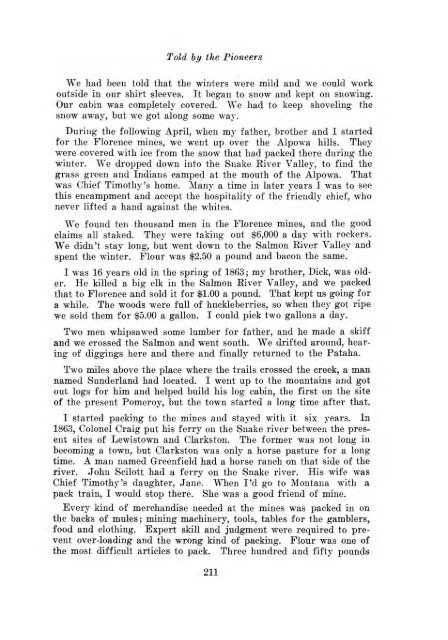Told by the Pioneers - Washington Secretary of State
Told by the Pioneers - Washington Secretary of State
Told by the Pioneers - Washington Secretary of State
You also want an ePaper? Increase the reach of your titles
YUMPU automatically turns print PDFs into web optimized ePapers that Google loves.
<strong>Told</strong> <strong>by</strong> <strong>the</strong> <strong>Pioneers</strong><br />
We had been told that <strong>the</strong> winters were mild and we could work<br />
outside in our shirt sleeves. It began to snow and kept on snowing.<br />
Our cabin was completely covered. vVe had to keep shoveling' <strong>the</strong><br />
snow away, but we got along some way.<br />
During <strong>the</strong> following April, when my fa<strong>the</strong>r, bro<strong>the</strong>r and I started<br />
for <strong>the</strong> Florence mines, we went up over <strong>the</strong> Alpowa hills. They<br />
were covered with ice from <strong>the</strong> snow that had packed <strong>the</strong>re during <strong>the</strong><br />
winter. vVe dropped down into <strong>the</strong> Snake River Valley, to find <strong>the</strong><br />
grass green and Indians camped at <strong>the</strong> mouth <strong>of</strong> <strong>the</strong> Alpowa. That<br />
was Chief Timothy's home. Many a time in later years I was to see<br />
this encampment and accept <strong>the</strong> hospitality <strong>of</strong> <strong>the</strong> friendly chief, who<br />
never lifted a hand against <strong>the</strong> whites.<br />
vVe found ten thousand men in <strong>the</strong> Florence mines, and <strong>the</strong> g'ood<br />
claims all staked. They were taking out $6,000 a day with rockers.<br />
We didn't stay long, but went down to <strong>the</strong> Salmon River Valley and<br />
spent <strong>the</strong> winter. Flour was $2.50 a pound and bacon <strong>the</strong> same.<br />
I was 16 years old in <strong>the</strong> spring' <strong>of</strong> 1863; my bro<strong>the</strong>r, Dick, was older.<br />
He killed a big elk in <strong>the</strong> Salmon River Valley, and we packed<br />
that to ~-'lorence and sold it for $1.00 a pound. That kept us going for<br />
a while. The woods were full <strong>of</strong> huckleberries, so when <strong>the</strong>y got ripe<br />
we sold <strong>the</strong>m for $5.00 a gallon. I could pick two gallons a day.<br />
Two men whipsawed some lumber for fa<strong>the</strong>r, and he made a skiff<br />
and we crossed <strong>the</strong> Salmon and went south. We drifted around, hearing<br />
<strong>of</strong> diggings here and <strong>the</strong>re and finally returned to <strong>the</strong> Pataha.<br />
Two miles above <strong>the</strong> place where <strong>the</strong> trails crossed <strong>the</strong> creek, a man<br />
named Sunderland had located. I went up to <strong>the</strong> mountains and got<br />
out logs for him and helped build his log cabin, <strong>the</strong> first on <strong>the</strong> site<br />
<strong>of</strong> <strong>the</strong> present Pomeroy, but <strong>the</strong> town started a long time after that.<br />
I started packing to <strong>the</strong> mines and stayed with it six years. In<br />
1863, Colonel Craig put his ferry on <strong>the</strong> Snake river between <strong>the</strong> present<br />
sites <strong>of</strong> Lewistown and Clarkston. The former was not long in<br />
becoming a town, but Clarkston was only a horse pasture for a long<br />
time. A man named Greenfield had a horse ranch on that side <strong>of</strong> <strong>the</strong><br />
river. John Scilott had a ferry on <strong>the</strong> Snake river. His wife was<br />
Chief Timothy's daughter, Jane. When I'd go to Montana with a<br />
pack train, I would stop <strong>the</strong>re. She was a good friend <strong>of</strong> mine.<br />
Every kind <strong>of</strong> merchandise needed at <strong>the</strong> mines was packed in on<br />
<strong>the</strong> backs <strong>of</strong> mules; mining machinery, tools, tables for <strong>the</strong> gamblers,<br />
food and clothing. Expert skill and judgment were required to prevent<br />
over-loading and <strong>the</strong> wrong kind <strong>of</strong> packing. Flour was one <strong>of</strong><br />
<strong>the</strong> most difficult articles to pack. Three hundred and fifty pounds<br />
211
















